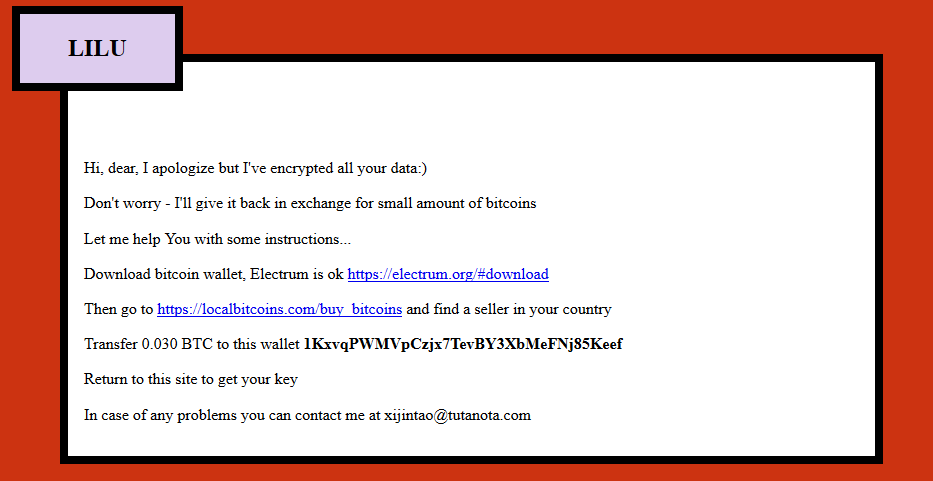Vulnerability testing specialists report that, over the most recent days, thousands of cases of infection have been detected by a dangerous new ransomware variant that compromises web servers and encrypts stored files.
This ransomware variant, dubbed as Lilocked or Lilu, has been active for just over a month, but its most important activity period includes the last two weeks, as mentioned.
About a month ago, some victims of this ransomware began uploading screenshots of the ransom note sent by Lilu operators on the platform ID Ransomware, a website that, based on screenshots and samples of the encrypted files, allows users to identify the malware variants used to infect a system. “Apparently this ransomware variant only infects Linux-based systems, at least that’s what the evidence collected so far suggests,” vulnerability testing specialists mention.
However, this time the Ransomware ID database only managed to confirm that both the method of attack against compromised servers and the encryption used by Lilu are never seen before techniques.
On the other hand, a forum frequented by vulnerability testing experts has mentioned that Lilu operators are likely to attack systems running non supported Exim software. However, experts have not found the way this malware gets root access to servers.

Although it is a new variant of ransomware, it is very easy to identify a Lilu infection, as the malware encrypts almost all files on the compromised server, subsequently adding the .lilocked extension to the encrypted files. Finally, the ransom note is shown to the victim; in addition, the hackers include a copy of that note in each folder that stores some encrypted document.
The malware includes a feature to redirect the victim to a portal hosted on dark web, where they will find complete instructions to pay the ransom. Attackers usually demand a payment of 0.03 Bitcoin (about $350 USD depending on the current exchange rate) from each victim.
Researchers note that the Lilu ransomware does not fully compromise the activities of the infected server, as it does not encrypt system files and only refers against a group of extensions like HTML, JS, PHP, in addition to some content formats multimedia.
According to vulnerability testing specialists at the International Institute of Cyber Security (IICS), this ransomware has already infected at least 6,500 servers, many of which are indexed to popular search engines. Although some details are already known about this new malware variant, the number of victims could grow in a significant way.

He is a well-known expert in mobile security and malware analysis. He studied Computer Science at NYU and started working as a cyber security analyst in 2003. He is actively working as an anti-malware expert. He also worked for security companies like Kaspersky Lab. His everyday job includes researching about new malware and cyber security incidents. Also he has deep level of knowledge in mobile security and mobile vulnerabilities.











